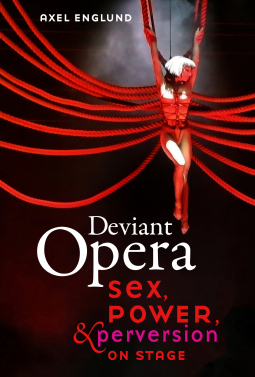
Deviant Opera
Sex, Power, and Perversion on Stage
by Axel Englund
This title was previously available on NetGalley and is now archived.
Send NetGalley books directly to your Kindle or Kindle app
1
To read on a Kindle or Kindle app, please add kindle@netgalley.com as an approved email address to receive files in your Amazon account. Click here for step-by-step instructions.
2
Also find your Kindle email address within your Amazon account, and enter it here.
Pub Date Oct 06 2020 | Archive Date Dec 08 2020
Talking about this book? Use #DeviantOpera #NetGalley. More hashtag tips!
Description
Imagine Armida, Handel’s Saracen sorceress, performing her breakneck coloraturas in a black figure-hugging rubber dress, beating her insubordinate furies into submission with a cane, suspending a captive Rinaldo in chains from the ceiling of her dungeon. Mozart’s peasant girl Zerlina, meanwhile, is tying up and blindfolding her fiancé to seduce him out of his jealousy of Don Giovanni. And how about Wagner’s wizard, Klingsor, ensnaring his choir of flower maidens in elaborate Japanese rope bondage?
Opera, it would appear, has developed a taste for sadomasochism. For decades now, radical stage directors have repeatedly dressed canonical operas—from Handel and Mozart to Wagner and Puccini, and beyond—in whips, chains, leather, and other regalia of SM and fetishism. Deviant Opera seeks to understand this phenomenon, approaching the contemporary visual code of perversion as a lens through which opera focuses and scrutinizes its own configurations of sex, gender, power, and violence. The emerging image is that of an art form that habitually plays with an eroticization of cruelty and humiliation, inviting its devotees to take sensual pleasure in the suffering of others. Ultimately, Deviant Opera argues that this species of opera fantasizes about breaking the boundaries of its own role-playing, and pushing its erotic power exchanges from the enacted to the actual.
Advance Praise
"What if opera’s fascination with fetish iconography were not mere stylistic overlay, but rather an invitation to read contemporary opera as sadomasochistic power exchange? This is Axel Englund’s central provocation in Deviant Opera—one that yields fresh insight into the workings of BDSM play, performance, and transgression on and off stage."—Margot Weiss, author of Techniques of Pleasure: BDSM and the Circuits of Sexuality
"Smart, brave, and deeply knowledgeable. Opera criticism does not get better than this."—Lawrence Kramer, author of The Hum of the World: A Philosophy of Listening
"Any opera lover who dismisses a BDSM-inflected opera production as simply the latest Regietheater fad needs to read this riveting study. Englund uncovers surprisingly analogous connections between BDSM (its conventions, "transgressions," and semiotics) and opera—a cultural practice that has luxuriated in extremes of sexuality, violence, and power for four centuries."—Kristi Brown-Montesano, author of Understanding the Women of Mozart's Operas
Available Editions
| EDITION | Other Format |
| ISBN | 9780520343252 |
| PRICE | $32.95 (USD) |
| PAGES | 277 |
Average rating from 2 members
Featured Reviews
 Anne M, Librarian
Anne M, Librarian
Englund's look at sexuality in opera is interesting and challenging while still remaining accessible to readers outside of academia. In particular, the examination of why popular culture has turned to more and more overtly sexual staging of operas and what it means in terms of the content of the original works is more than interesting enough to hold a book club's or independent study group's interest.



